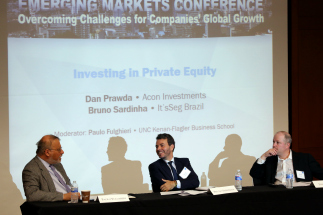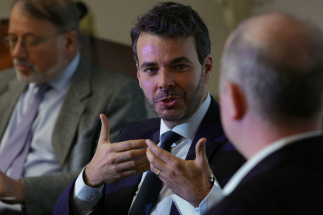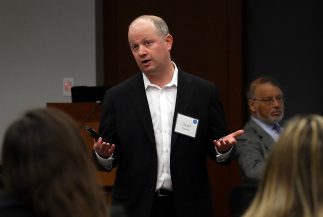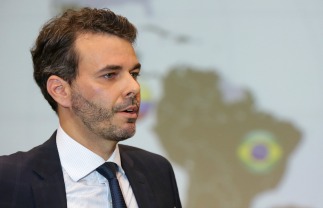News & Stories
Private equity investors set sights on Latin America
 American investors are looking south when it comes to private equity.
American investors are looking south when it comes to private equity.
Latin America is one of the top emerging markets for private equity investments – and that’s where Daniel Prawda, a principal at ACON Investments, and Bruno Sardinha (MBA ’01), chief operating officer at It’sSeg Brazil, are focusing most of their efforts.
Prawda, an industry veteran who works with the U.S. middle market and Latin America practices at ACON, says more and more investment firms are setting their sights on Latin America – specifically in Brazil, Mexico and Colombia.
“With the U.S. middle markets getting increasingly competitive, several U.S. firms are starting to look outside the country,” he says. “There’s not a lot of growth in Europe right now, so to generate attractive private equity returns you need to go to emerging markets. Latin America is increasingly becoming a more compelling alternative for several investment firms.”
Prawda and Sardinha shared their insights during the “Investing in Private Equity” panel at UNC Kenan-Flagler’s 2015 Emerging Markets Conference hosted by the Global Business Center in collaboration with the Emerging Markets Club and Latin American Business Association. The panel, moderated by Macon G. Patton Distinguished Professor of Finance Paolo Fulghieri, discussed how to succeed in the dynamic markets of Latin America and what to look for when investing in new companies.
 Here are some tips and takeaways shared by the panel:
Here are some tips and takeaways shared by the panel:
Think long-term profitability.
When investing in emerging markets, consider a three-to-five-year outlook, says Sardinha, who works in Brazil. The country is currently facing a political crisis that is affecting the economy – but private equity professionals know the crisis won’t last forever and take a long-term view, he says.
Business plans and models should take the long-term view into account and allow for flexibility, agrees Prawda. “Having contingency plans and being able to adapt quickly to changing conditions are critical to having a successful outcome.”
Buy cheap.
Buying at an attractive entry multiple is one of the most important steps to generating value in private equity, says Prawda. One way ACON does this is by purchasing “corporate orphans” in Latin America.
“Latin America has consistently seen waves of multinational companies entering and then exiting the region. Understanding these trends can help realize multiple arbitrage by purchasing assets from multinationals cheaply when they are exiting the region and securing a premium price for these same assets when they compete with each other to come back into the region.” For big multinationals, Latin America is generally a rounding error. Prawda noted that in several of the corporate orphan transactions he pursued while at ACON, the companies were able to grow more successfully as stand-alone entities given they were able to receive the capital, resources and strategic direction needed to thrive, which they were not receiving when they formed part of larger multinationals.
 Find strategic buyers.
Find strategic buyers.
The lack of liquid markets in Latin America requires private equity investors to be more creative in how they structure deals there.
“In Latin America, you need to think strategically about how to build a business for potential liquidity event. You need to think about who the eventual buyer of the business will be and how you can shape and fashion the business to make it more attractive to that buyer universe,” advises Prawda, adding that private equity investors generally want to see a liquidity event within about 5 years.
Take a pan-regional approach.
There’s an ongoing debate in the Latin America equity field as to whether firms should be country-specific or pan-regional in focus. ACON – one of the only firms to have successfully completed exits in Brazil, Colombia, Mexico, Venezuela, Ecuador and other nations – has found success catering to the region as a whole, says Prawda.
“A pan-regional approach is good because there are always diverging macro trends in the economies of the region,” he says. “Having the flexibility to play the right macro trends is critical. If you raise a Brazil fund, you might have a lot of pressure to invest money there – and that might not be the best place to do it. Our ability to take a pan-regional approach and look at various different economies in Latin America has led to good results.”
Adapt to the economy.
While the Brazilian economy might be weakening and becoming more volatile, investing in the country is still attractive, says Sardinha. “Private equity tends to be contrarian,” he explains. “With the crisis, assets become cheaper.”
At the same time, economies of other nations in the region are getting stronger. Over the next five years, GDP growth in Colombia, Chile and Mexico is expected to outpace that of world averages – and that will drive all sorts of business, says Prawda. The region “has evolved a lot since the 1980s,” with lots of favorable trends such as open markets, deregulation, improved rule of law and free markets.
 Recruit talented professionals.
Recruit talented professionals.
Talented professionals are scarce in Latin America, posing one of the biggest obstacles firms face when looking at investing in the region. “It’s not easy to find good people,” says Sardinha.
The initial stages – when things are not defined yet – are the toughest times for firms to recruit and retain talent. “People get scared about what’s going to happen,” he says. “It’s very important to stay close, communicate the vision and direction, quickly map the talent and work together with them.”
Prawda advises students and professionals interested in entering the industry to discover what they are passionate about and pitch themselves to firms that are a good match. “The big firms aren’t the only ones out there. There are lots of smaller, niche investment strategies – including geography-specific and industry-specific funds – that can benefit from professionals with more unique insights to those particular segments,” he says.
Build relationships and your reputation.
Relationships are the impetus behind many private equity deals in the Latin American region. When a family needs capital or a partner, they go to their network, says Prawda. “If you have a good reputation and someone speaks highly of you, they’ll come to you.”
Stay alert and on top of your game.
In the early 2000s, ACON began investing in the Internet. But those investments strayed from ACON’s core competencies and resulted in what Prawda says is one of the biggest challenges he faced early in his career.
His advice to investors: “I think it is important to know what you are good at,” says Prawda. “Focus on your core competencies and as you look to grow, find areas that are contingent to those competencies and allow you to build and expand upon them.”
The most successful private equity investors never stop paying attention to the markets, adds Sardinha. “The key is to be constantly monitoring and assessing opportunities in the sector. It’s a job that never ends.”